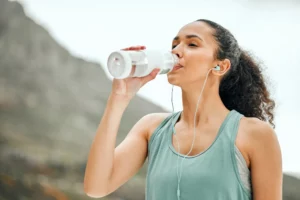Water is a necessary element of our overall health and well-being. It plays a crucial role in maintaining bodily functions and keeps us hydrated. However, there are several common misconceptions about water consumption that need to be clarified. In this ultimate guide, we will explore the importance of water, debunk myths, and provide personalized recommendations for daily water intake.
Understanding the role water plays in our bodies
Water is not only vital for quenching our thirst but also plays a significant role in various bodily functions. It acts as a lubricant for joints and helps transport nutrients and oxygen to our cells. Additionally, water aids in digestion and metabolism by breaking down food and eliminating waste products from our bodies.
Factors that affect daily water intake
The amount of water each person needs can vary depending on several factors. One important factor is body weight. Generally, individuals with higher body weight require more water to stay properly hydrated. Physical activity also influences our hydration needs, as sweating during exercise causes water loss. Furthermore, climate has an impact on our hydration levels, with hot and humid conditions increasing the need for more water intake.
Recommended daily water intake guidelines
Understanding the 8×8 rule
You might have heard of the 8×8 rule, which suggests drinking eight 8-ounce glasses of water per day. However, it is essential to evaluate this guideline critically. While it provides a good starting point, it may not apply to everyone. Critics argue that other factors, such as individual activity levels and climate, should be considered when determining water intake.
Tailoring water intake to personal needs
To meet individual requirements, it is crucial to consider factors like age, pregnancy, and physical activity levels. Recommended fluid intake can vary across different age groups, with children and older adults needing specific attention. Pregnant and nursing individuals often require increased water consumption due to the demands of their bodies. Similarly, athletes and highly active individuals need to replenish fluids lost during intense workouts to maintain optimal performance.
Signs of dehydration and overhydration
Common symptoms of dehydration
Dehydration can have various symptoms, including thirst, dry mouth, fatigue, dizziness, and decreased urine output. It is important to recognize these signs as early as possible to prevent further complications.
Recognizing the signs of overhydration
On the other hand, overhydration can also be harmful. Symptoms such as confusion, nausea, headache, and swelling can indicate excessive water intake. Maintaining a balanced water intake and being aware of the signs of both dehydration and overhydration is crucial for optimal health.
How to track and measure water intake
To ensure that you are consuming an adequate amount of water, there are practical methods to track and measure your intake. Utilizing water tracking apps and gadgets can help you stay on top of your hydration goals. Additionally, creative strategies like setting reminders or using water bottles with marked measurements can assist in monitoring your daily water consumption.
Alternate sources of hydration
Hydration isn’t limited to water alone. Many fluids and foods can contribute to your overall hydration levels. Consuming fruits and vegetables with high water content, such as watermelon and cucumber, can help boost hydration. Understanding the water content in different beverages, such as herbal teas and certain fruit juices, can also assist in meeting your hydration needs.
Hydration tips for specific circumstances
Maintaining proper hydration is crucial in various situations, such as during travel or while working or studying for extended periods. When traveling, it’s important to have a water bottle handy and stay mindful of your fluid intake. Similarly, individuals who spend long hours working or studying should prioritize hydration by keeping a water bottle nearby and taking regular breaks to drink water.
Does coffee, tea, or alcohol dehydrate the body?
Exploring the diuretic effects of caffeine and alcohol
The diuretic effects of caffeine and alcohol have led to the belief that they dehydrate the body. While both caffeine and alcohol can increase urine production temporarily, moderate consumption does not have significant dehydrating effects on most individuals. However, excessive intake can lead to water loss and should be avoided.
Factoring in water equivalents when consuming these beverages
When consuming coffee, tea, or alcohol, it’s important to remember that these beverages can contribute to your overall water intake. Although they may contain diuretic properties, the water content in these drinks can help maintain hydration levels. It’s important to strike a balance and consider the water equivalents of these beverages when evaluating your daily water intake.
Debunking water myths
Clearing misconceptions about excessive water consumption
Contrary to popular belief, excessive water consumption does not necessarily provide added health benefits. Overhydration can lead to electrolyte imbalances and water intoxication, which can be harmful to the body. It’s important to consume water in moderation according to your individual needs.
Addressing the idea of water as a weight-loss tool
While proper hydration is essential for overall health, it is not a magical weight-loss tool. While drinking water can temporarily increase metabolism, it does not directly lead to significant weight loss. Maintaining a balanced diet and regular exercise remain the key factors in achieving and maintaining a healthy weight.
Health benefits of drinking enough water
Adequate water intake has numerous health benefits, including improved cognitive function and focus. Staying hydrated can enhance mental clarity and help combat fatigue. Additionally, proper hydration plays a vital role in maintaining skin health, keeping it moisturized and reducing the risk of skin-related issues.
Water quality and its impact on health
The quality of the water we consume is essential for our well-being. While tap water is generally considered safe, it’s important to evaluate the specific sources and check for any contaminants. Filtering tap water or opting for bottled water can provide added assurance of purity.
Water conservation and sustainable practices
Preserving clean water sources is crucial for the environment and future generations. Adopting eco-friendly water consumption habits, such as turning off taps when not in use and avoiding excessive water waste, can contribute to water conservation efforts.
Summary:
In summary, water consumption is vital for our overall health and well-being. Tailoring water intake to individual needs, understanding the signs of dehydration and overhydration, and considering alternate sources of hydration are all important factors to maintain optimal health. Furthermore, debunking water myths, recognizing the health benefits of drinking enough water, and being mindful of water quality and conservation can contribute to a healthier lifestyle.
FAQs:
What are the risks of overhydration?
Overhydration can lead to electrolyte imbalances, water intoxication, and potentially serious health complications. It’s important to maintain a proper balance of water intake.
Are certain populations more prone to dehydration?
Yes, certain populations, such as older adults and children, are more prone to dehydration due to physiological differences and increased water requirements.
How can I encourage children to drink enough water?
Encouraging children to drink water can be done by setting a good example, making it easily accessible, using fun water bottles, and incorporating hydrating foods like fruits into their diet.
Can drinking water help with headaches?
Drinking water can help relieve certain types of headaches, especially those caused by dehydration. Staying properly hydrated can reduce the frequency and intensity of headaches.




